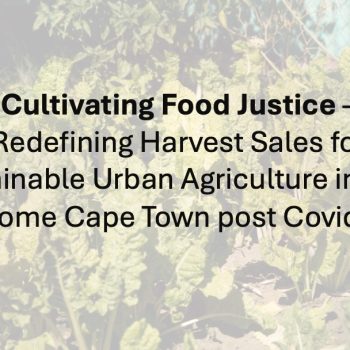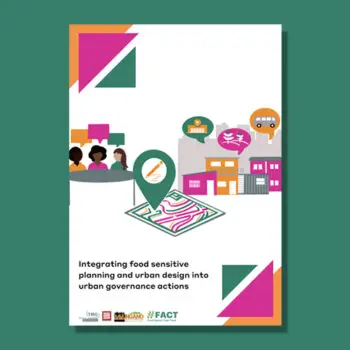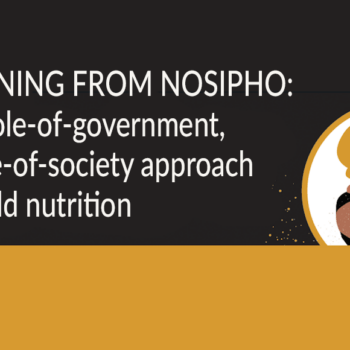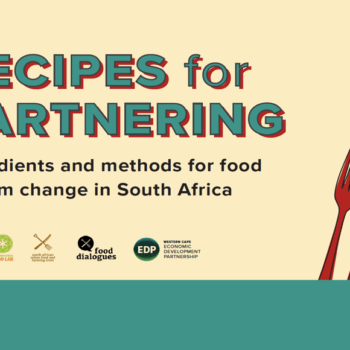Bio
Gareth Haysom is an urban food systems researcher at the African Centre for Cities at the University of Cape Town. He co-leads (with Jane Battersby) the Urban Food Systems Research Cluster at the ACC. He holds a PhD from the University of Cape Town and a MPhil from Stellenbosch University. Gareth’s work focuses on the intersection between the urban system and the food system. Haysom uses food as a lens to better understand urbanisation in cities of the global South with a specific interest in African cities, working across a variety of countries and city types.
The premise motivating this work is that Africa’s future will be an urban one and a narrow window exists in which to respond to the specific needs of the varied urban forms and typologies before the future is cast in concrete.
Food, food system challenges, the nutrition transition, the rise in diet related non communicable diseases, the triple nutrition burden and everyday food system related questions offer a unique perspective on how African cities are changing and how urbanites navigate the urban everyday. This lens also emphasises the flaws in existing food system policies and governance, particularly the scale at which such policies and governance are enacted. A food system lens clearly shows the intersections between the built environment, infrastructure, and poverty and inequality. Importantly, using urban food as a lens to understand cities provides a useful way to show how food and nutrition outcomes are linked directly to the nature and quality of physical, social, and ecological infrastructure, something that has not traditionally been viewed as the responsibility of built environment professionals or urban policy makers.
Haysom has published widely but given how exclusionary existing academic paywalls are for African researchers, Haysom publishes in a variety of ways, through working papers, open access books and other briefs and media.
Haysom teaches on a number of courses at UCT, specifically the Urban Food Security post graduate course (in the Department of Environmental and Geographical Sciences) and the Masters in Sustainable Urban Practice (African Centre for Cities), where he leads the urban food systems module. He previously established the first Masters course in sustainable food systems (Stellenbosch University) and serves as an external assessor for various post graduate courses.
Haysom actively works with officials in various African cities, attempting to embed food systems activities in planning and urban governance. Gareth acts in an advisory role for Africa-focused development support organisations and UN bodies (specifically UN FAO and UN Habitat).
PUBLICATIONS
Edited books
- Crush, J., Frayne,. B. and Haysom, G. (eds) (2020). Handbook on Urban Food Security in the Global South. Edward Elgar, Cheltenham
Book chapters
- Haysom, G. and Battersby, J. (in press – July 2023). Urban Food Security and Resilience, in Bene, C. and Devereux, S. (eds). Resilience and Food Security in a Food Systems Context, Palgrave Macmillan (Open Access).
- Haysom, G and Battersby, J. (In Press – July 2023). Urban Food Systems Governance in Africa: Towards a Realistic Model for Transformation, in Resnick, D. and Swinnen, J. (eds). Political Economy of Food System Transformation, IFPRI-OUP, Washing DC.
- Haysom, G. and Battersby, J. (In Press – May 2023). The URBAL approach and the after-life of a food systems innovation process: The Nourish to Flourish governance process in Cape Town, South Africa, in Blay Palmer, A., Chaboud, A., Di Battista, A. and Valette, E. (eds). URBAL: an evaluation tool of the role of food innovations in building sustainable food systems, Routledge.
- Haysom, G. (2022). Understanding Secondary City Typologies: A Food Governance Lens, In Riley, L. and Crush, J. (eds). Transforming Urban Food Systems in Secondary Cities in Africa, Barnes and Noble, 25-44 (see: https://www.barnesandnoble.com/w/transforming-urban-food-systems-in-secondary-cities-inafrica-liam-riley/1141322482)
- Haysom, G. and Currie, P. (2022). Food Policy Councils and governance partnerships in African urban contexts, In Moragues-Faus, A., Clark, J., Battersby, J. and Davies, A. (eds). Routledge Handbook of Urban Food Governance. Routledge (see: https://www.routledge.com/Routledge-Handbook-of-Urban-Food-Gov…ce/Moragues-Faus-Clark-Battersby-Davies/p/book/9780367518004#)
- Haysom, G. (2020). Perspectives on urban food-system governance in the Global South. In Crush, J.,Frayne,. B. and Haysom, G. (eds). Handbook on Urban Food Security in the Global South. Edward Elgar, Cheltenham. 363 – 379.
- Crush, J., Frayne,. B. and Haysom, G. (2020) Introduction to urban food security in the Global South. In Crush, J., Frayne,. B. and Haysom, G. (eds). Handbook on Urban Food Security in the Global South. Edward Elgar, Cheltenham. 1 – 22.
- Battersby, J. and Haysom, G. (2020). Urban Food Security. In Massey, R. and Gunter, A. (eds) Urban Geography in South Africa: Perspectives and Theory. Springer Nature, Cham. Switzerland. 251 – 264.
- Smit, W., Durakovic, E., Sitas, R., Johansson, M., Haysom, G., Dymitrow, M., Ingelhag, K., & Kotze, S. (2020). Replicating projects for comparative research: Mistra Urban Futures’ experiences with comparative work on knowledge exchange, food and transport. In D. Simon, H. Palmer, & J. Riise (Eds.), Comparative urban research from theory to practice: Co-production for sustainability (pp. 63-88). Bristol, UK: Policy Press.
- Troosters, W., Auerbach, R. and Haysom, G. (2020).Strengthening Participation in the Organic Value Chain for Small-scale Farmers in Southern KwaZulu-Natal, South Africa. In Auerbach, R. (ed) Organic Food Systems Meeting the Needs of Southern Africa, CABI International, Oxfordshire , UK. 113 – 129.
- Battersby, J. and Haysom, G. (2019). How Food Secure are South African Cities? In Knight, J. and Rogerson, C. (eds). The Geography of South Africa: Contemporary Changes and New Directions. Springer Nature, Cham. Switzerland. 169 – 178.
- Battersby, J, and Haysom, G. (2018). Linking urban food security, urban food systems, poverty, and urbanization. In Battersby, J and Watson, V. (eds). Urban Food Systems Governance and Poverty in African Cities. Routledge, Oxon. 56 – 67.
- Haysom, G. (2018). Alternative food networks in the global South, in Frayne, B., Crush, J. & McCordic, C. (eds). Food and Nutrition Security in Southern African Cities. Routledge, Oxon. 9 – 23.
- Haysom, G. and Fuseini, I. (2018). Urban social protection and food systems: Lessons from South Africa. in Frayne, B., Crush, J. & McCordic, C. (eds). Food and Nutrition Security in Southern African Cities. Routledge, Oxon. 66 – 85.
- Haysom, G. (2017). Climate change, food and the city: Agency and urban scale food system networks, in Thomas-Hope, E. (ed). Climate Change and Food Security: Africa and the Caribbean, Routledge, London. 145-155.
- Haysom, G. (2016). Agro-ecological farming and soil rehabilitation, in Swilling, M., Musango, J. and Wakeford, J. (eds). Greening the South African Economy: Scoping issues, challenges and opportunities. UCT Press, Cape Town. pp 96 – 111.
- Haysom, G. (2015). The Philippi Fresh Produce Market: Misunderstood Development?, in Brown-Luthango, M. (ed.). in State/Society Synergy in Philippi, Cape Town. African Centre for Cities. Cape Town.
- Haysom G. (2015). Urban scale food system governance: An alternative response to the dominant paradigm?, in Allen, A., Lampis, A. and Swilling, M. (eds). Untamed Urbanisms. Routledge, Oxon. pp 76-88.
- Haysom, G. (2012). The Ithemba Farmer’s story of climate change and food security adaptation in Cape Town, South Africa – Housing versus food?, in Frayne, B., Moser, C. and Ziervogel, G. (eds.). Climate Change, Assets and Food Security in Southern African Cities. Earthscan, London.
- Haysom, G. and Metelerkamp, L. (2012). Agriculture – From vulnerability to viability, in Swilling, M., Sebitosi, B. and Loots, R. (eds). Sustainable Stellenbosch, opening dialogues. SUNMedia, Stellenbosch.
- Kelly, C., Schulschenk, J., Landman, A. and Haysom, G. (2012). Food – A sustainable system for Stellenbosch, in Swilling, M., Sebitosi, B. and Loots, R. (eds). Sustainable Stellenbosch, opening dialogues. SUNMedia, Stellenbosch.
- Haysom, G. (2010). Urban Agriculture in the City of Cape Town, in Swilling, M. (ed). Sustaining Cape Town: Imagining a Livable City. Stellenbosch, SunMedia. pp 211-223
- Ashley, C. and Haysom, G. (2008). The development impacts of Tourism Supply Chains – increasing impact and decreasing our ignorance, in Spenceley, A. (ed), 2008. Responsible Tourism: Tourism, Conservation and Poverty alleviation in Southern Africa. London, Earthscan
Journal articles
- Haysom, G. (2022). Planning for Resilient, Nourishing, and Generative African Urban Landscapes. African Journal of Landscape Architecture, 3(2), Online: https://www.ajlajournal.org/articles/planning-forresilient-nourishing-and-generative-african-urban-landscapes
- Haysom, G., (2021). Integrating Food Sensitive Planning and Urban Design into Urban Governance Actions. Urban Forum, 1 – 22. https://doi.org/10.1007/s12132-021-09417-9
- Smit, W., Simon, D., Durakovic, E., Dymitrow, M., Haysom, G., Hemström, K., & Riise, J. (2021). The challenge of conflicting rationalities about urban development: Experiences from Mistra Urban Futures’ transdisciplinary urban research. Trialog, 137, 31-37.
- Haysom, G., Olsson, E.G.A., Dymitrow, M., Opiyo, P., Taylor Buck, N., Oloko, M., Spring, C., Fermskog, K., Ingelhag, K., Kotze, S. Agong’, S.G. (2019). Food Systems Sustainability: An Examination of Different Viewpoints on Food System Change, Sustainability, 11, 1 – 17.
- Haysom, G., and Tawodzera, G. (2018). “Measurement drives diagnosis and response”: Gaps in transferring food security assessment to the urban scale. Food Policy, 74, 117-125.
- Pieterse, E., Parnell, S., and Haysom, G. (2018). African dreams: locating urban infrastructure in the 2030 sustainable developmental agenda. Area development and policy, 3(2), 149-169.
- Haysom, G. (2015). Food and the City: Urban Scale Food System Governance. Urban Forum, 26(3), 263-281.
- Haysom, G. (2013). Save Cape Town’s Pantry. Topos, About Landscape, 82, 99-103.
- Ashley, C., and Haysom, G. (2006). From philanthropy to a different way of doing business: Strategies and challenges in integrating pro-poor approaches into tourism business. Development Southern Africa, 23(2), 265-280.
Working papers
- Devereux, S., Haysom, G., Maluf, R.S. and Scott-Villiers, P. (2022). Challenging the Normalisation of Hunger in Highly Unequal Societies, IDS Working Paper 582, Brighton: Institute of Development Studies, DOI: 10.19088/IDS.2022.086
- Haysom, G., Metelerkamp, L., Buthelezi, N., Weru, J. and Battersby, J. (2022). Integrating food sensitive planning and urban design into urban governance actions. TMG Working Paper. ISBN: 978-3-910560-59-8
- Haysom, G., Battersby, J. and Park-Ross, R. (2020). Food Sensitive Planning and Urban Design – A Blueprint for a Future South African City? Food Security SA Working Paper Series. Working Paper 007. Centre of Excellence in Food Security. University of the Western Cape. (Peer Reviewed).
- Even-Zahav, E., Drimie, S. & Haysom, G. (2020). A Food Charter for the Western Cape? A Critical Inquiry and Scoping Study. Food Security SA Working Paper Series. Working Paper 006. Centre of Excellence in Food Security. University of the Western Cape. (Peer Reviewed).
- Haysom, G. (2020). Urban Food Governance Perspectives in Changing African and Southern Cities HCP Discussion Paper No. 39, Waterloo and Cape Town.
- Haysom, G. Working Paper Series editor, with Battersby, J. and Watson, V. (2016 – 2019). Consuming Urban Poverty Working Paper series. See: https://consumingurbanpoverty.wordpress.com/workingpapers/
- Haysom, G. and Fuseini, I. (2019). Governing Food Systems in Secondary Cities in Africa, Consuming Urban Poverty Project Working Paper No. 10, African Centre for Cities, University of Cape Town.
- Haysom, G. (2018). Food insecurity and alternative food networks in cities of the Global South. Hungry Cities Partnership Discussion Paper #19.December 2018. African Centre for Cities, University of Cape
- Town, South Africa, and Wilfrid Laurier University/Balsillie School of International Affairs, Waterloo, Canada.
- Crush, J., Caesar, M. and Haysom, G. (2018). The state of household food security in Cape Town, South Africa. Hungry Cities Report #12. African Centre for Cities, University of Cape Town, South Africa, and Wilfrid Laurier University/Balsillie School of International Affairs, Waterloo, Canada.
- Haysom, G., Caesar, M. and Crush, J. (2017). The Urban Food System of Cape Town, South Africa. Hungry Cities Report #3. African Centre for Cities, University of Cape Town, South Africa, and Wilfrid Laurier University/Balsillie School of International Affairs, Waterloo, Canada.
- Haysom, G. (2016). Alternative food networks and food insecurity in South Africa, Working Paper 33. Cape Town: PLAAS, UWC and Centre of Excellence on Food Security.
- Skinner, C. and Haysom, G. (2016). The Informal economy: A missing link in policy debates? Working Paper 44. Cape Town: PLAAS, UWC and Centre of Excellence on Food Security.
- Battersby, J. and Haysom, G. (2016). Africa’s Urban Food and Nutrition Transition: A Call to Action. Consuming Urban Poverty Project Working Paper 1. Governing Food Systems to Alleviate Poverty in Secondary Cities in Africa Project. African Centre for Cities, University of Cape Town.
Other media
- Haysom G. (2023). The growth of food banks in Africa: Foodbanks have arrived in Africa, can they tackle food poverty? BBC World Service: The Food Chain. See: https://www.bbc.co.uk/programmes/w3ct38p6
- Devereux, S. & Haysom, G. (2022). Malnutrition and hunger take hold in SA – a land of plenty where political will is lacking. Daily Maverick, 16 October 2022.Online: https://www.dailymaverick.co.za/article/2022-10-16-malnutrition-and-hunger-take-hold-in-sa-a-land-ofplenty-where-political-will-is-lacking/
- Haysom, G. & Battersby, J. (2022). Applying secondary city typologies as a means to engage urban food governance and planning in African cities, in 20 + years of RUAF. UA38 (July 2022). See: www.ruaf.org
- Haysom, G. and Battersby, J. (2021). Rebuilding cities: Better planning for better health. The Nourished Child Blog Post: 07 April, 2021. Online: https://www.africancentreforcities.net/rebuilding-cities-betterplanning-for-better-health/
- Haysom, G. (2021). Spilling the beans: Revealing the complexity at the heart of urban food systems. The Nourished Child Blog Post: 07 April, 2021. Online: https://www.africancentreforcities.net/spilling-thebeans-revealing-the-complexity-at-the-heart-of-urban-food-systems/
- Skinner, C. and Haysom, G. (2020). Feeding cities: Informal retailers play crucial role in urban food security. Street Vendors and Public Space. An E-Reader by WIEGO, 17 – 20. Online: https://www.wiego.org/sites/default/files/resources/file/Street%20Vendors%20and%20Public%20Space%20-%20An%20EBook.pdf
- Haysom, G. (2020). We all need to be concerned about urban food insecurity – and we all have a role to play: New forms of urban food security governance are long overdue In Barends, Z. and Drimie, S. (eds)
- Challenging False Narratives in a Global Crisis Reflections on Human Rights, Inequality and Securing Food Systems. Community Chest World Hunger Day 2020 special publication. 20 – 22. Online: https://issuu.com/eltena/docs/world_hunger_2020_final_02062020
- Haysom, G. (2020). Who wakes up and worries about food insecurity in the city? Hungry Cities blog post April 4, 2020. Online: https://hungrycities.net/who-wakes-up-and-worries-about-food-insecurity-in-thecity/
- Haysom, G. (2020). When “Slow Violence” Collides with Visceral Hunger: COVID-19 and the Current and Future Food System of Cape Town, South Africa. BoasBlog Witnessing Corona blog post. This article was simultaneously published on the Blog Medical Anthropology / Medizinethnologie. Witnessing Corona is a joint blog series by the Blog Medical Anthropology / Medizinethnologie, Curare: Journal of Medical Anthropology, the Global South Studies Center Cologne, and boasblogs. June 29, 2020. Online: https://boasblogs.org/witnessingcorona/when-slow-violence-collides-with-visceral-hunger/ (peer reviewed).
- Haysom, G. and Battersby, J. (2016) Why urban agriculture isn’t a panacea for Africa’s food crisis The Conversation Africa, 15 April 2016, https://theconversation.com/why-urban-agriculture-isnt-a-panaceafor-africas-food-crisis-57680
- Haysom, G. and Battersby, J. (2016) Urban Agriculture: The answer to Africa’s food crisis? Quest 12(2) 8-9 Online: https://www.researchgate.net/publication/320805362_Haysom_G_and_Battersby_J_2016_Urban_Agriculture_The_answer_to_Africa%27s_food_crisis_Quest_122_8-9
- Pieterse, E., Parnell, S. and Haysom, G. (2015). Towards an Africa Urban Agenda. Africa’s position for Habitat III. UN-Habitat, Nairobi, Kenya.
- Haysom, G. (2014) Food Security or Low Cost Housing Online: https://www.researchgate.net/publication/262685304_Food_Security_or_Low_Cost_Housing
- Haysom, G, & Battersby-Lennard, J. (2012) Ask yourself: Where do my vegetables come from? BusinessDay, 19 August 2012, http://www.bdlive.co.za/opinion/2012/08/06/ask-yourself-where-do-myvegetables-come-from
- Haysom, G. (2012). What gets trampled in a tug of war? A researcher’s observations on the pressure points between food security and low cost housing development in an urban area. Viewpoint, Earthworks Magazine, 10, 127 – 132.
Selected Recent Presentations
- Urban food governance perspectives in changing African and Southern cities. 2nd Cologne Conference on Food for Future, 2021. 13 September 2021 (Online presentation).
- The Promises and Pitfalls of Multi-Stakeholder Food Governance. Centre of Excellence in Food Security Community of Practice, 04 October 2021 (Online presentation).
- On the table: Designing food security solutions for South Africa. Presentation at the Creative Exchange, Cape Design Institute, 02 June 2021 (Hybrid event)
- Food Sensitive Planning and Urban Design – Bringing food back into the planning domain (with Jane Battersby and Mary Brown-Luthango), Presentation to Western Cape Department of Environment and Planning, 19 July 2022 (Online presentation).
- The state of food and nutrition security in African cities – a case for food sensitive planning. Presentation at ILASA/IFLA/UDISA Health & Vitality Conference 2021, 15 October 2021 (Online presentation).
- Understanding City Typologies – Secondary Cities and Food Governance. Presentation at ICLEI #AfricanCITYFOODMonth 2021, 29 July 2021 (Online presentation).
- Understanding City Typologies – Secondary cities and Food Governance. Presentation at COGTA/WCEDP Small Towns Knowledge Building Event, 05 August 2021 (Online presentation).
- The informal economy – an essential enabler of urban food and nutrition security. Presentation at request of StreetNet International, 10 August 2021 (Online presentation).
- The Hungry Cities Partnership – A point in a journey to deepen urban food systems understanding. Presentation to Masters of Demography and Urban Planning Students at Eduardo Mondlane University, 14 March 2022 (Online presentation).
- Understanding City Typologies – small and intermediary cities and Food Governance. Presentation to Food and Agriculture Organization Convened event focused on urban food system managers. 04 April 2022 (Online presentation).
- Feeding Intermediary Cities – Intermediary cities as essential actors in Africa’s urban, and food system, transformations. Presentation delivered at request of UN FAO at UCLG Africa AfriCities Conference,Kisumu, Kenya, 18 May 2022.
- Governing Africa’s growing cities: Africa’s demographic transition and the essential changes in food systems governance, planning and policies. Presentation as part of an ICLEIAfrica/FAO/SDGs Event Convened by ICLEI Africa, 21 July 2022 (Online presentation).
Students supervised (including year of graduation)
- Joseph Dennis Nii Noi Quarcoo (2022). Your Mess, My Life: The Junction between Land Use Planning and Street Vending in the Accra Mall Enclave. (MPhil) in Southern Urbanism, Environmental and Geographical Sciences, University of Cape Town.
- Brain, R. (2020). Being a teen, tween and in-between girl in Mitchell’s Plain: Toward a heterogenous conception of youth agency in a Global South city. (MPhil) in Southern Urbanism, Environmental and Geographical Sciences, University of Cape Town.
- George, R. P. (2019). Unlocking Small-Scale Fisheries Value Chains through Information & Communication Technology (ICT) – the case studies of Lamberts Bay & Kleinmond, South Africa. (MSc) Environmental and Geographical Sciences, University of Cape Town.
- Muramba, F. (2018). Informal food processing and packaging: A case of Maputi production in Harare, Zimbabwe. (MPhil) Development Studies, Sociology Department, University of Cape Town.
- Drewett, J. (2018). Student Food Security: the (Dis)connection Between Student Food Experiences, Sustainability and Green Spaces from the Lens of Food Security. (MSc) Environmental and Geographical Sciences, University of Cape Town.
- Marie, A. (2017). Sustainable urban agriculture: a sustainable adaptation strategy for the City of Cape Town? Practices and views on sustainable urban agriculture and climate change in Cape Town. (Mphil) Environmental and Geographical Sciences, University of Cape Town.
- Cuff, A. (2016). An exploration of the competing policy imperatives in the Philippi Horticultural Area. (BSocSci, Hons) Environmental and Geographical Sciences, University of Cape Town.
- Gibson, W. (2016). Agro-ecological and Conservation Agriculture principles to assist large-scale dryland sugarcane farmers in the KwaZulu-Natal Midlands South region to improve soil quality. School of Public Leadership, Stellenbosch University. (MPhil) in Sustainable Development, School of Public Leadership, University of Stellenbosch
- Davies, F. (2015). Reconceptualising urban food security: an analysis of the everyday negotiations of food access in Lusaka, Zambia. School of Public Leadership, Stellenbosch University. (MPhil) in Sustainable Development, School of Public Leadership, University of Stellenbosch.
- van der Merwe , M. (2015). Integrating Aquaculture with Crop Systems: An Aquaponic Enterprise Project Proposal for the Ntinga Multipurpose Co-Operative in Philippi, South Africa, School of Public Leadership, Stellenbosch University. (Co-supervised with Henk Stander). (MPhil) in Sustainable Development, School of Public Leadership, University of Stellenbosch.
- Troesters, W. (2015). Demand driven rural agricultural development in South Africa. (Co-supervised with R. Auerbach) MTech, Nelson Mandela Metropolitan University.
- Minnie, M. (2012). Urban Agriculture in Cape Town & The City Of Cape Town Urban Agriculture Policy 2007: To what extent the Policy contributes towards enabling the development of urban agriculture in the City. (Mphil) Environmental and Geographical Sciences, University of Cape Town.
- van Niekerk, C. (2012). The benefits of agritourism: Two case studies in the Western Cape.
- Welter, K., 2012. Sustainability in the Restaurant Industry: A Cape Town Study. (MPhil) in Sustainable Development, School of Public Leadership, University of Stellenbosch
- Payn, V. (2011). ‘Ilima’, ‘Izithebe’ and the ‘Green Revolution’. A complex agro-ecological approach to understanding agriculture in Pondoland and what this means for sustainability through the creation of ‘Living Landscapes’ (Cum Laude). (MPhil) in Sustainable Development, School of Public Leadership, University of Stellenbosch.
- Boulogne, F. (2009). Building Sustainable Communities through Participation – Analysing the transition from participatory planning to implementation in the case of the Grabouw Sustainable Development Initiative. (MPhil) in Sustainable Development, School of Public Leadership, University of Stellenbosch.
- !Hoaës, I. (2009). Does Post-Settlement Support Play a Role in the Success of Land Reform? The Case of Resettlement Beneficiaries in Namibia. (MPhil) in Sustainable Development, School of Public Leadership, University of Stellenbosch.
- Savaio, D. (2009). Building Sustainable Settlements in Chimoio, Mozambique -The Sustainability of Using Unfired Adobe Bricks to Construct Shelter. (MPhil) in Sustainable Development, School of Public Leadership, University of Stellenbosch.
- Moloto, K. (2009). The potential of sustainable agricultural practices to enhance soil carbon sequestration and improve soil quality. (MPhil) in Sustainable Development, School of Public Leadership, University of Stellenbosch.
- Kelly, C. (2008). Lower external input farming methods as a more sustainable solution for small-scale farmers (Cum Laude). (MPhil) in Sustainable Development, School of Public Leadership, University of Stellenbosch.
Post-Doctoral Students Supervised
- Toriro, P. (2019). Scholarship undertook to investigate the gap between academia and practice and is currently involved in knowledge generation that seeks to produce university teaching materials whilst providing practitioners with tools for evidence-based policymaking and strategy development.
- Graeme Young (2018). Undertook his scholarship at the African Centre for Cities at the University of Cape Town and working with the Western Cape Government on issues of informality and the urban food sector.
International Student Supervision
- Burger, M. (2017). Rethinking resilient urban food systems: Vulnerability to food insecurity as a
- consequence of drought – the case of Cape Town, (Co-Supervised with van Westen and Battersby). (MA)
- Sustainable Development, International Development, Utrecht University.
- Oldsen-thor Straten, I. (2019). Valuing the Philippi Horticultural Area for the City of Cape Town
- A case study on Spatial justice of agricultural land in the city in a city of the south. (Co-Supervised with
- Bernd Siebenhuner). (MA) in Sustainability Economics and Management, Department of Business
- Administration, Economics and Law, Carl von Ossietzky Universitat Oldenburg.





